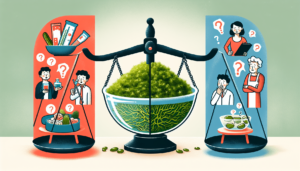The Best Fluffy Pancakes recipe you will fall in love with. Full of tips and tricks to help you make the best pancakes.

If you’re expecting and wondering about the safety of sea moss consumption during pregnancy, you’ll find the answers you’re looking for here. Pregnancy is a time when dietary choices have a significant impact on both the mother and the baby, so it’s crucial to make informed decisions. In this article, we’ll explore the potential benefits and risks of consuming sea moss while pregnant, so you can confidently navigate this important phase of your life.

What is sea moss?
Sea moss, also known as Irish moss or Chondrus crispus, is a type of seaweed that is widely recognized for its numerous health benefits. This red algae is rich in minerals and nutrients, making it a popular choice for those looking to improve their overall well-being.
Definition
Sea moss is a seaweed that is commonly found along the Atlantic coastlines of North America, Europe, and the Caribbean. It is often used in culinary dishes, as well as in the production of various products such as gels, powders, and supplements.
Nutritional content
Sea moss is a powerhouse of nutrients, providing essential vitamins and minerals that are beneficial for overall health. It is particularly high in iodine, magnesium, potassium, and calcium, all of which are important for maintaining a healthy pregnancy. Additionally, sea moss contains vitamins A, C, E, and K, as well as B vitamins and fiber, which are essential for supporting a well-rounded diet.
Is sea moss safe for pregnant women?
When it comes to consuming sea moss during pregnancy, it is important to consider both the potential benefits and risks. While sea moss does offer several nutritional advantages, there are a few factors that pregnant women should be aware of.
Potential benefits
Sea moss is known for its ability to support overall health and well-being, and this is no exception for pregnant women. Some potential benefits of consuming sea moss during pregnancy include:
-
Rich source of nutrients: Sea moss is packed with essential vitamins, minerals, and fiber that are crucial for a healthy pregnancy. These nutrients can contribute to the development of the baby and support the mother’s overall well-being.
-
Supports healthy pregnancy: The high iodine content in sea moss can help support thyroid function, which is important for regulating metabolism and promoting a healthy pregnancy. Additionally, the presence of calcium and magnesium can aid in the development of the baby’s bones and muscles.
-
Boosts immune system: Sea moss contains antioxidants that can help strengthen the immune system and protect against common illnesses during pregnancy. A strong immune system is essential for both the mother and the baby’s well-being.
Potential risks
While sea moss is generally considered safe for consumption, there are a few potential risks to be aware of:
-
Contamination concerns: Sea moss, like other seafood, can sometimes be contaminated with heavy metals or harmful bacteria. Pregnant women should ensure that they are sourcing their sea moss from a reputable supplier and properly washing it before consumption.
-
Potential allergic reactions: Some individuals may have an allergic reaction to sea moss, which can range from mild symptoms like itching and swelling to more severe reactions such as difficulty breathing. It is important to be aware of any allergies or sensitivities you may have before consuming sea moss.
-
Intestinal discomfort: Sea moss can have a laxative effect, which may cause gastrointestinal discomfort, such as bloating or diarrhea, in some individuals. Pregnant women should be mindful of their own digestive sensitivities and adjust their intake accordingly.
Benefits of sea moss for pregnant women
Sea moss can offer several benefits specifically for pregnant women. Here are some advantages of incorporating sea moss into a pregnancy diet:
Rich source of nutrients
Sea moss is a nutrient-dense food that provides pregnant women with essential vitamins and minerals. It is particularly high in iodine, which is crucial for supporting the baby’s brain development and thyroid function. Additionally, sea moss offers calcium and magnesium, which are important for the growth of the baby’s bones and muscles.
Supports healthy pregnancy
The nutrients present in sea moss can contribute to a healthy pregnancy. The vitamins and minerals in sea moss help in supporting the mother’s overall well-being and promoting proper fetal development. Sea moss can provide the necessary nutritional support to ensure a successful pregnancy.
Boosts immune system
Pregnant women often experience changes in their immune system, making them more susceptible to infections and illnesses. Sea moss contains antioxidants that can help boost the immune system, providing protection against common ailments. By incorporating sea moss into their diet, pregnant women can enhance their defenses and support their overall health.
Risks and considerations for pregnant women
While sea moss offers numerous benefits, pregnant women should be aware of potential risks and considerations before including it in their diet.
Contamination concerns
Sea moss, like other seafood, can sometimes be contaminated with heavy metals or harmful bacteria. Pregnant women should be cautious about the source of their sea moss and ensure that it is purchased from a reputable supplier that tests for contamination. It is also important to thoroughly rinse sea moss before consumption to remove any potential contaminants.
Potential allergic reactions
Some individuals may have allergic reactions to sea moss. Symptoms can range from mild itching or swelling to more severe reactions such as difficulty breathing. If you have a history of seafood allergies or sensitivities, it is advisable to avoid sea moss or consult with a healthcare provider before incorporating it into your diet during pregnancy.
Intestinal discomfort
Sea moss has a natural laxative effect, which can lead to gastrointestinal discomfort in some individuals. Pregnant women should be mindful of their own digestive sensitivities and adjust their intake accordingly. It is always best to start with smaller quantities and gradually increase as tolerated.
Recommended intake of sea moss during pregnancy
When it comes to the recommended intake of sea moss during pregnancy, it is important to seek guidance from a healthcare professional who is familiar with your specific health needs. They can provide personalized advice based on your individual circumstances.
Medical advice
It is crucial to consult with a healthcare provider, such as an obstetrician or a registered dietitian, before incorporating sea moss into your pregnancy diet. They can provide guidance on the appropriate intake, taking into consideration any pre-existing medical conditions or dietary restrictions you may have.
Moderation is key
As with any food, moderation is key when consuming sea moss during pregnancy. While it offers several nutritional benefits, it is important not to overconsume. The American Pregnancy Association recommends sticking to a balanced diet and obtaining nutrients from a variety of sources.
Alternative pregnancy-friendly superfoods
If you are looking for alternative pregnancy-friendly superfoods to incorporate into your diet, here are a few options:
Leafy greens
Leafy greens such as spinach, kale, and Swiss chard are packed with essential nutrients like folate, iron, and calcium. These vegetables can provide important vitamins and minerals that support a healthy pregnancy.
Citrus fruits
Citrus fruits like oranges, grapefruits, and lemons are excellent sources of vitamin C, which is essential for collagen production and iron absorption. They can also provide a refreshing and hydrating addition to your diet.
Legumes
Legumes, such as lentils, beans, and chickpeas, are rich in protein, fiber, and folate. They are a great plant-based source of nutrients that can support a healthy pregnancy.
Whole grains
Whole grains like quinoa, brown rice, and whole wheat bread are high in fiber, B vitamins, and minerals. These grains can provide sustained energy and contribute to a well-rounded pregnancy diet.
Tips for incorporating sea moss into a pregnancy diet
If you decide to incorporate sea moss into your pregnancy diet, here are a few tips to keep in mind:
Consultation with healthcare provider
Before adding sea moss to your pregnancy diet, it is important to consult with your healthcare provider. They can assess your individual nutritional needs and provide guidance on the appropriate intake. This is especially important if you have any pre-existing medical conditions or dietary restrictions.
Proper preparation and cooking
Properly rinse and soak sea moss before use to remove any potential contaminants. Follow recommended cooking instructions to ensure the seaweed is properly cooked and safe for consumption.
Incorporating in smoothies or sauces
Sea moss can be easily incorporated into smoothies or sauces for a nutrient boost. It can be blended into fruit smoothies or used as a thickening agent in sauces and dressings. This can be a convenient and delicious way to reap the benefits of sea moss during pregnancy.
Conclusion
Sea moss can be a beneficial addition to a pregnancy diet due to its rich nutritional content. It offers a range of vitamins, minerals, and fiber that can support a healthy pregnancy and boost the immune system. However, pregnant women should be mindful of potential risks such as contamination and allergic reactions. It is always advisable to consult with a healthcare provider before incorporating sea moss or any new food into your pregnancy diet. Remember to prioritize a balanced and varied diet that includes other pregnancy-friendly superfoods for optimal health and well-being during this special time.




